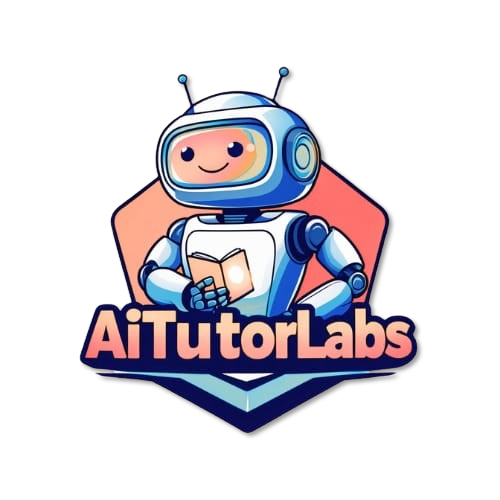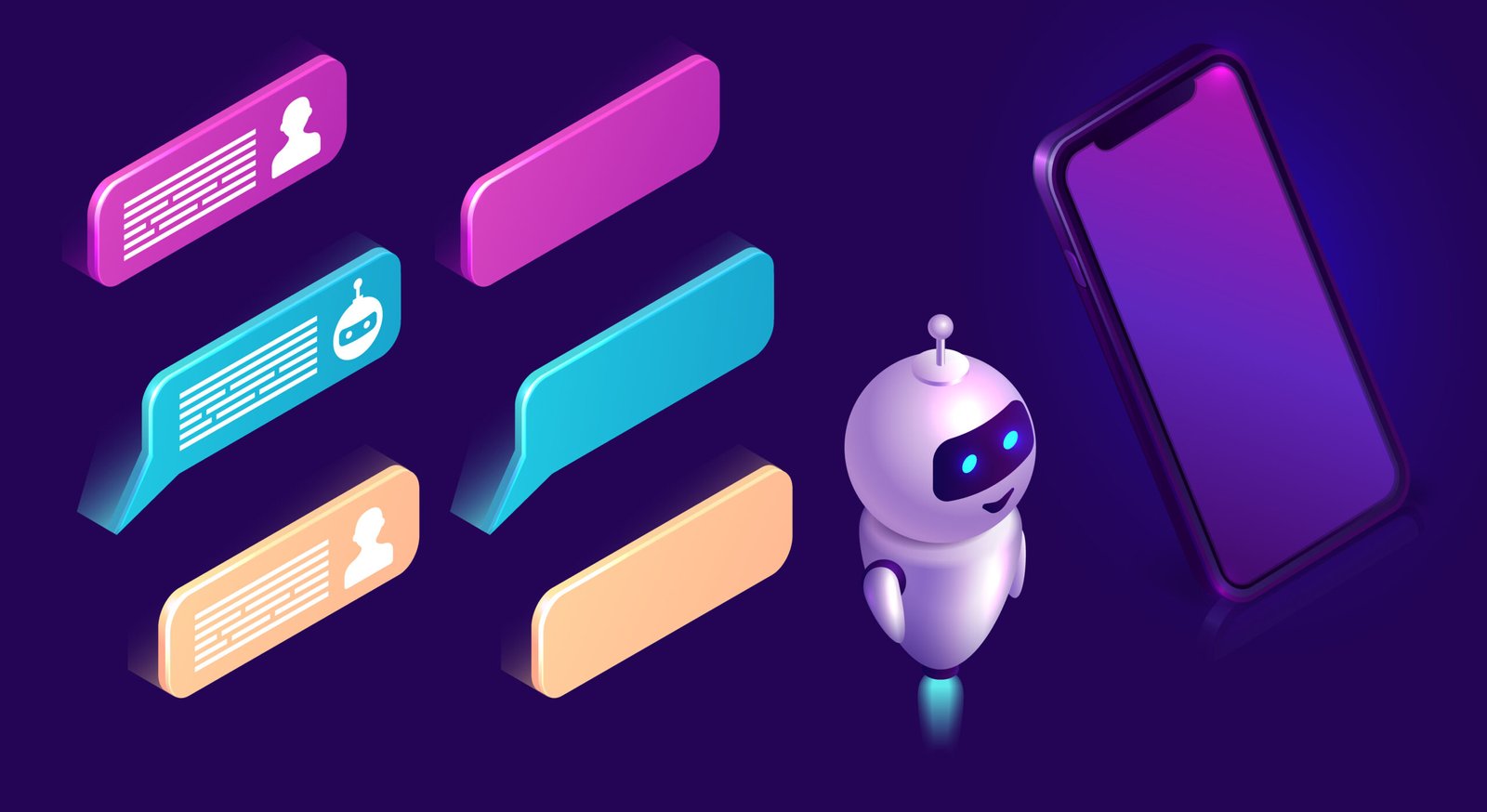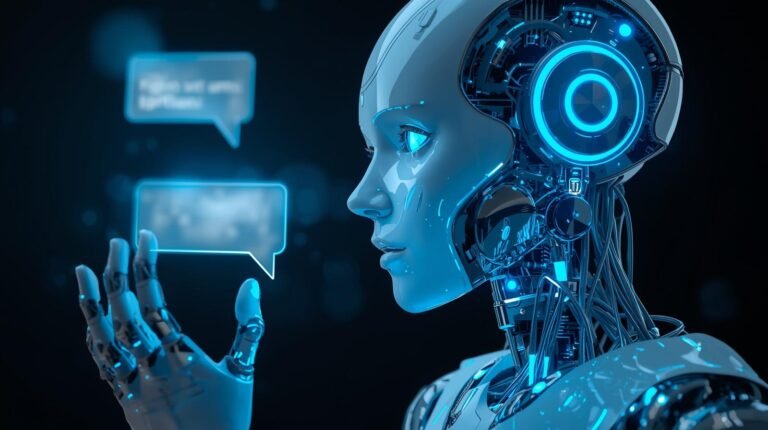Do you know any business owner who still hasn’t explored AI chatbots for customer service? Tag that person immediately.
Customer expectations are higher than ever in 2025. Think about it. Fast responses, 24/7 support, and personalized interactions are no longer optional; they’re essential.
For small and medium businesses, keeping up with these rising expectations can feel overwhelming. That’s where AI chatbots step in. They take the pressure off by providing instant, reliable support.
These tools don’t just answer customer questions; they learn, adapt, and improve over time. The best part? They free up your human support team to focus on complex issues while the chatbot handles routine queries.
If you’ve ever wondered which chatbot is right for your business, you’re not alone. The key is knowing which platforms deliver real value without breaking the bank. That’s where this guide comes in.
We’ll explore the best AI chatbots for customer service in 2025, break down real-world use cases, and give you a snapshot of their features and pricing.
What Is an AI Chatbot for Customer Service?
At its core, an AI chatbot is software powered by artificial intelligence and natural language processing (NLP) that can interact with customers through text or voice. Unlike old-school “rule-based bots,” today’s AI chatbots can understand context, personalize responses, and even integrate with your CRM or help desk.
For small businesses, chatbots are a game-changer: they save time, reduce support costs, and keep customers happy around the clock.
Here’s one thing you should know: the best AI chatbots don’t just respond—they create experiences that build trust and loyalty.
Quick Snapshot of the Best AI Chatbots
| Tool | Best For | Typical Use Case |
| Intercom Fin AI | Personalized support & automation | An eCommerce brand uses it to handle FAQs and escalate complex queries to human agents. |
| Drift AI | Conversational sales & support | A B2B SaaS company uses Drift to qualify leads and book demos automatically. |
| Tidio AI | Affordable all-in-one chatbot | A small boutique responds instantly to customer questions on product sizes and delivery. |
| Zendesk Answer Bot | Seamless helpdesk integration | A startup routes customer complaints through Zendesk with AI-driven ticketing. |
| Ada AI | Scalable automation for growth | A fintech company automates multilingual customer support across regions. |
| Freshchat | Omnichannel conversations | A retailer manages website, WhatsApp, and Messenger chats in one place. |
| HubSpot Chatbot | Marketing + support integration | A consulting firm uses HubSpot to capture leads and nurture them with automated chat. |
Top 7 AI Chatbots for Customer Service in 2025
1. Intercom Fin AI: Smart Support That Feels Human
When it comes to customer engagement, Intercom is a market leader. Their Fin AI sets the bar high with GPT-powered responses that pull real-time data from your knowledge base.
Intercom has been a household name in customer communication, and with the launch of Fin AI, they’ve taken things up a notch. What makes Fin special is how natural and human-like its responses feel.
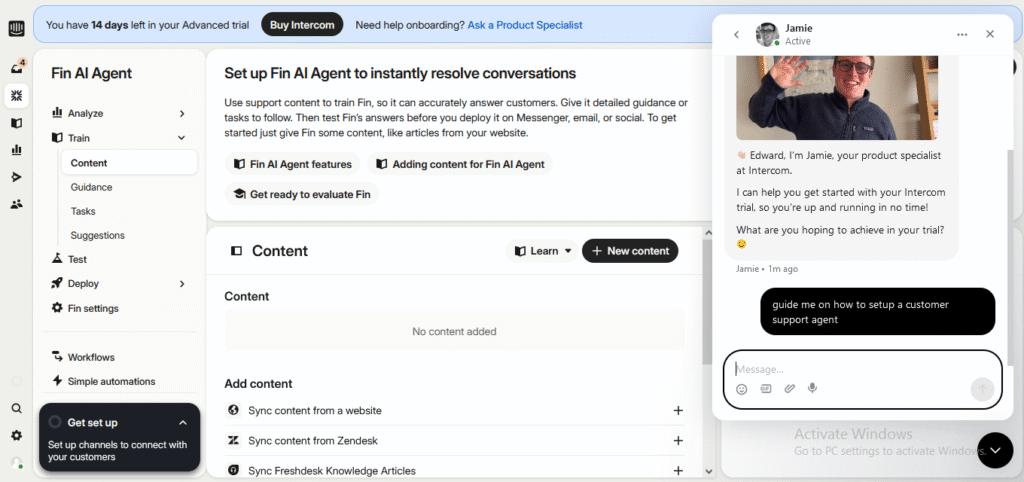
Instead of giving robotic or generic answers, Fin pulls directly from your company’s knowledge base to provide accurate, context-rich support in real time. That means if a customer asks about shipping, returns, or product details, Fin responds as though it’s a well-trained team member who already knows your business inside out.
The beauty of Fin AI is that it doesn’t stop at answering questions. When the issue goes beyond what an AI can resolve—like handling a billing dispute—it instantly escalates the case to a live agent with all the context intact.
This seamless handoff saves customers from repeating themselves, which everyone knows can be frustrating. For small businesses, Fin is like having an extra support agent who never sleeps, never calls in sick, and keeps customers engaged around the clock.
Features and Pricing of Intercom Fin
- Features: GPT-powered responses, helpdesk integration, multilingual support, real-time escalation.
- Pricing: Starts at ~$39/month per seat, with AI usage billed separately.
2. Drift AI: Chatbot That Sells and Supports
Drift AI isn’t just another chatbot—it’s a tool that bridges customer service and sales. While it can absolutely handle support queries like order updates or FAQs, its real power lies in capturing and qualifying leads right from your website.
Imagine someone lands on your homepage and asks, “How much does your software cost?” Instead of sending them to a generic pricing page, Drift AI can answer with tailored information, guide them toward the right plan, and even book a meeting with your sales team. It does this all automatically.
This is especially powerful for B2B companies where every lead counts. The chatbot doesn’t just wait for customers to come to you; it proactively starts conversations, making visitors feel noticed and supported.
If you’ve got a SaaS product, for example, Drift AI can handle basic onboarding questions while ensuring hot leads don’t slip through the cracks. It’s like combining customer service, marketing, and sales into one tool that works 24/7.
Features and Pricing of Drift AI
- Features: Conversational AI, lead qualification, CRM sync, calendar integration.
- Pricing: From $2,500/year (popular with B2B).
3. Tidio AI: Budget-Friendly Powerhouse
Tidio is perfect for small businesses on a budget. It combines live chat and AI-driven automation, with strong integrations for eCommerce.
If you’re running a small business and you’re worried about costs, Tidio AI is an excellent entry point. It’s designed to be affordable but surprisingly powerful, giving you access to both live chat and AI automation in one simple dashboard.
The setup is straightforward—you can get it running on your website in minutes, and it integrates smoothly with platforms like Shopify and WooCommerce. For online stores, this can be a lifesaver. Customers browsing at midnight can instantly ask about delivery times, product sizing, or returns, and Tidio AI will be there to help.
The best part? Tidio doesn’t just respond with generic templates. It learns from your customer conversations and improves over time. You can even customize it to fit your brand’s tone of voice so that your customers feel like they’re talking to your business, not a robot.
For many small boutiques and local shops, Tidio becomes that “extra team member” who takes care of customer questions while you focus on running the business. And since it has a free plan, it’s a low-risk way to dip your toes into AI-powered support.
Features and Pricing of Tidio AI
- Features: AI chatbot, live chat, Shopify/WooCommerce integrations, analytics.
- Pricing: Free plan; AI features start at $29/month.
4. Zendesk Answer Bot: Best for Existing Zendesk Users
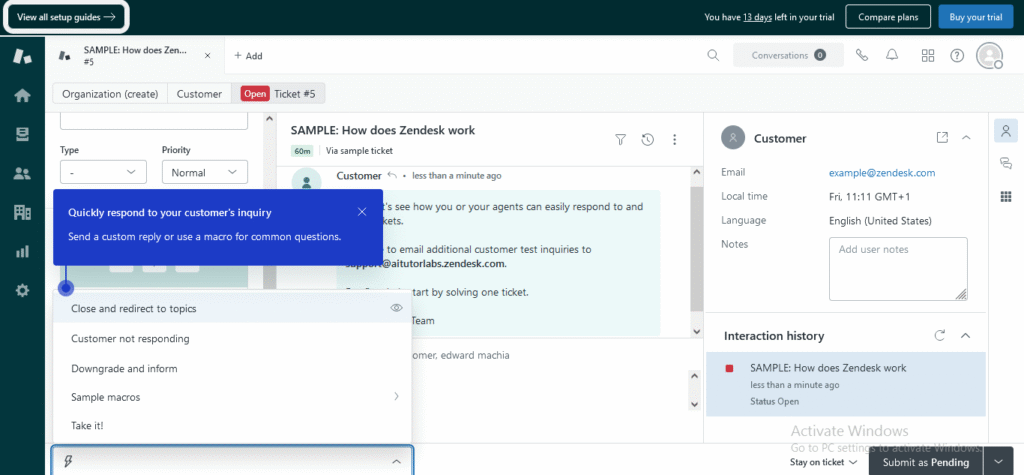
If your team is already using Zendesk for customer service, the Answer Bot is like adding rocket fuel to your existing setup. Instead of waiting for a human agent, customers can type their question and get an immediate answer pulled directly from your help center articles.
This not only speeds up response times but also deflects repetitive questions that agents normally spend hours answering. Questions like “How do I reset my password?” or “Where’s my order?”
What’s great about Answer Bot is how tightly it integrates into the Zendesk ecosystem. When the issue is too complex, the bot passes it to a live agent, complete with a conversation history so the customer doesn’t need to repeat themselves.
For businesses already invested in Zendesk, this is an easy win. It feels natural, doesn’t require extra training, and starts delivering value almost immediately. The more you feed your knowledge base, the smarter it becomes, making it ideal for teams who want AI but don’t want to overhaul their support process.
Features and Pricing of Zendesk Answer Bot
- Features: AI-driven suggestions, deep helpdesk integration, multilingual support.
- Pricing: Included in Zendesk Suite ($55/month per agent+).
5. Ada AI: Enterprise-Grade Automation
Ada is designed for high-volume support with advanced personalization. It’s great for scaling businesses and multilingual audiences.
When it comes to scale, Ada AI is built for businesses with big customer bases and global reach. Unlike some smaller tools that focus on basic FAQs, Ada specializes in deep automation.
It integrates with CRMs, ticketing systems, and even back-end tools so that the chatbot doesn’t just talk—it can actually perform tasks. Imagine a customer asking to update their billing address or check their account balance; Ada can connect to your systems and make it happen without human intervention.
Another standout feature is Ada’s multilingual support. If you’re serving customers across different regions, Ada can handle conversations in multiple languages seamlessly.
This makes it a favorite among fintechs, airlines, and fast-scaling SaaS companies. While it’s definitely a higher investment compared to small business tools like Tidio, Ada pays off by drastically reducing ticket volume and keeping customer satisfaction high across diverse markets.
Features and Pricing of Ada AI
- Features: AI-first automation, personalization, multilingual support, analytics.
- Pricing: Custom enterprise pricing.
6. Freshchat (by Freshworks): Omnichannel Made Easy
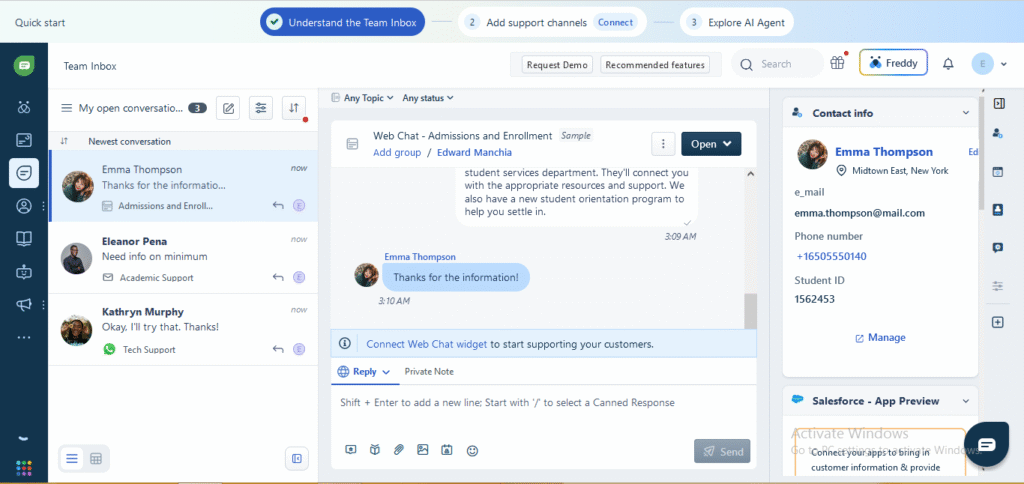
Freshchat is a strong choice for businesses needing multi-channel support. It integrates with WhatsApp, Messenger, and website chat.
Customers today aren’t just reaching out through your website. They’re messaging you on WhatsApp, Facebook Messenger, Instagram DMs, and more.
Freshchat is designed to pull all of these conversations into one place, making it easier to keep track and respond consistently. With its AI capabilities, you can automate responses across all channels, so whether a customer asks about their order on Instagram or your website, they’ll get the same instant support.
Freshchat also plays nicely with the rest of the Freshworks suite, which is handy if you’re already using their tools for CRM or customer service. Even better, it offers a free plan for small teams, making it easy to test before committing.
For retailers or service providers with a presence on multiple platforms, Freshchat ensures you don’t lose a single conversation. It’s like having a central command center where all your customer interactions live.
Features and Pricing of Freshchat
- Features: Omnichannel messaging, AI chatbots, integrations with Freshworks suite.
- Pricing: Free plan; paid plans from $19/month per agent.
7. HubSpot Chatbot Builder: Marketing + Support Combo
If you’re already using HubSpot’s CRM or marketing suite, their Chatbot Builder is a no-brainer. It’s unique because it blends customer support with lead generation.
For example, a visitor might ask about your pricing, and the chatbot can not only provide the information but also capture their email and automatically log it in your CRM for future campaigns. It’s customer service and marketing working hand in hand.
The beauty of HubSpot’s chatbot is how customizable it is. You can set it up to route conversations to the right sales rep, share knowledge base articles, or trigger specific workflows. And since it’s baked right into the HubSpot ecosystem, every chat automatically becomes part of your customer’s journey.
For consultants, agencies, and small businesses that rely on inbound marketing, this tool is like having a personal assistant who knows exactly when to nurture a lead and when to hand them off to a human.
Features and Pricing of HubSpot Chatbot
- Features: Customizable bots, CRM sync, lead routing, knowledge base integration.
- Pricing: Free with HubSpot CRM; advanced automation in paid tiers.
Before Wrapping It Up: A Quick Comparison
| Tool | Best For | Typical Use Case | Starting Price |
| Intercom Fin AI | Personalized AI support | FAQs with escalation | $39/month |
| Drift AI | Sales + support | B2B lead capture & demos | $2,500/year |
| Tidio AI | Affordable automation | FAQs for eCommerce | Free / $29 |
| Zendesk Answer Bot | Integrated ticketing | Resolving support tickets | $55/agent |
| Ada AI | Enterprise automation | Multilingual global support | Custom pricing |
| Freshchat | Omnichannel messaging | WhatsApp + Messenger + site chat | Free / $19 |
| HubSpot Chatbot | Marketing + support | Lead gen + FAQs | Free / Paid tiers |
What Are Some Examples of Effective Customer Service Chatbots?
Some of the most effective customer service chatbots in 2025 are Intercom Fin AI, Tidio AI, Drift AI, and Zendesk Answer Bot. These platforms have proven themselves across industries by reducing response times, deflecting repetitive queries, and providing consistent 24/7 support.
For example, an eCommerce store using Tidio can instantly answer “Where’s my order?” questions, while Drift AI goes a step further by helping SaaS companies qualify leads and book demos automatically.
What makes these chatbots effective isn’t just their ability to chat—it’s their integration with real business workflows. They connect to CRMs, pull answers from knowledge bases, and hand off conversations to human agents when needed.
The result is a smooth customer experience where questions get answered instantly and customers feel supported, not ignored.
Which Is the Best AI Chatbot for Customer Service?
The “best” AI chatbot depends on your business needs and budget.
If you’re a small business looking for something affordable and easy to set up, Tidio AI is one of the best options—it has a generous free plan and works seamlessly with online stores. On the other hand, if you want a highly advanced chatbot that feels human and integrates deeply into your support system, Intercom Fin AI leads the pack in 2025.
For larger organizations with global customers, Ada AI and Zendesk Answer Bot shine because of their scalability and multilingual capabilities. The truth is, the best chatbot is the one that aligns with your current stage of growth.
Start simple, and as your customer base expands, you can upgrade to more sophisticated platforms.
What Is the Popular AI in 2025?
In 2025, the most popular AI tools in customer service are those powered by generative AI (like GPT-based systems).
These models make bots like Intercom Fin AI and Drift AI more conversational, contextual, and human-like than ever before. Instead of scripted, robotic answers, today’s AI chatbots understand intent, personalize interactions, and even adjust tone based on the customer’s mood.
Beyond chatbots, generative AI is also popular in areas like marketing (creating ad copy), eCommerce (product recommendations), and analytics (predicting customer behavior). Businesses in 2025 are leaning heavily on AI to do the “heavy lifting” so human teams can focus on creativity and complex problem-solving.
What Is the Future of Chatbots in Customer Service?
The future of chatbots in customer service is all about hyper-personalization and proactive support. Instead of waiting for a customer to ask a question, future chatbots will anticipate needs. For example, if a customer’s order is delayed, the bot might automatically send a status update with compensation options before the customer even asks.
We’re also seeing chatbots evolve into voice-based assistants that work across smart devices, not just text. Combine that with ongoing improvements in AI, and chatbots will become more like digital team members than simple support tools. For small businesses, this future means being able to offer enterprise-level customer service without the massive costs, leveling the playing field even further.
Recommended Starter Toolkit for Small Businesses
If you’re just starting and don’t want to overspend, here’s a practical AI chatbot starter pack:
- Tidio AI – Affordable, great for small online shops.
- Intercom Fin AI – For human-like support with escalation.
- HubSpot Chatbot – Perfect if you already use HubSpot CRM.
This combo covers support, lead generation, and automation—without blowing your budget.
Ready to Transform Your Customer Service in 2025?
With AI chatbots, customer support doesn’t have to be slow, repetitive, or expensive. From small boutiques to enterprise SaaS, there’s a solution for every business size and budget.
Here’s one thing to remember: the best AI chatbots don’t replace humans—they empower them by handling repetitive tasks and freeing your team to focus on building relationships.
FAQs on AI Chatbots for Customer Service in 2025
1. What’s the best free AI chatbot for small businesses?
Tidio AI and HubSpot Chatbot are strong free starting points.
2. Do chatbots replace human agents?
No. They handle repetitive queries, while humans focus on complex cases.
3. Are AI chatbots hard to set up?
Most modern platforms (like Tidio or Intercom) are plug-and-play with little coding.
4. Can chatbots work across multiple channels?
Yes—tools like Freshchat and Drift support site, social, and messaging apps in one panel.
5. How much should small businesses budget for AI chatbots?
Anywhere from $0 (free plans) to $50–$200/month for solid mid-tier tools.
